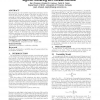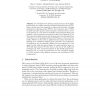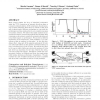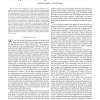44 search results - page 3 / 9 » The impact of network variabilities on TCP clocking schemes |
DAC
2009
ACM
14 years 29 days ago
2009
ACM
Manufacturing process variability impacts the performance of synchronous logic circuits by means of its effect on both clock network and functional block delays. Typically, varia...
EURONGI
2004
Springer
13 years 10 months ago
2004
Springer
It is well known that the large round trip time and the highly variable delay in a cellular network may degrade the performance of TCP. Many concepts have been proposed to improve ...
CCR
2011
13 years 1 months ago
2011
Many papers explain the drop of download performance when two TCP connections in opposite directions share a common bottleneck link by ACK compression, the phenomenon in which dow...
INFOCOM
2002
IEEE
13 years 11 months ago
2002
IEEE
Abstract—Interactive TCP applications, such as Telnet and the Web, are particularly sensitive to network congestion. Indeed, congestion-induced queuing and packet loss can be a s...
SENSYS
2005
ACM
13 years 11 months ago
2005
ACM
Radio duty cycling has received significant attention in sensor networking literature, particularly in the form of protocols for medium access control and topology management. Whi...




